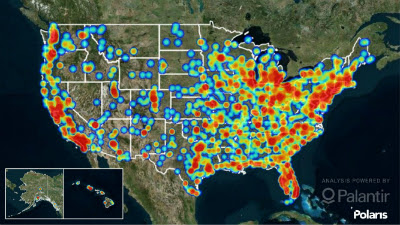U.S. National Human Trafficking Hotline Cases Soar by 25 Percent in 2018
From ATEST member Polaris Project
WASHINGTON, D.C.(July 30, 2019) – On the United Nations’ World Day Against Trafficking in persons, Polaris is announcing that human trafficking cases reported to the U.S. National Human Trafficking Hotline jumped by 25 percent in 2018 from 2017. In total, 10,949 cases of human trafficking were reported in 2018—the highest amount in a single year since Polaris began operating the National Hotline in 2007. Of those, 7,859 were sex trafficking cases and 1,249 labor were trafficking cases. In total, the National Hotline has handled 51,919 cases of human trafficking in the United States to date.
Case and detailed data for all 50 states and D.C. can be accessed here.
Download a fact sheet with a deeper analysis of the 2018 data here.

With 10,949 cases, 2018 marks the first year in which the National Hotline has handled more than 10,000 cases in a single 12-month period. Key highlights from the 2018 data include:
- Cases of labor trafficking decreased by 2 percent, indicating that the current climate of fear in immigrant and minority communities is likely suppressing reports to the National Hotline. Globally, as well as in the United States, experts believe labor trafficking is far more widespread than sex trafficking. Yet, the cases reported to the National Hotline rarely reflect that. A total of 1,249 cases of labor trafficking were reported in 2018, compared to 1,276 in 2017. Polaris believes that this year, as in other years, this is due in part to a lack of awareness about labor trafficking. Polaris also believes that foreign nationals, even those here through the U.S. government’s own temporary work visa program, are likely not reporting abuse and exploitation at work out of fear of law enforcement action and deportation. Read more about human trafficking on temporary work visas here and within domestic work here.
- More survivors than ever continue to reach out to be connected to services, with a 36 percent increase from 2017. In 2018, 3,218 individual survivors reached out the National Hotline, compared to 2,374 survivors in 2017. Data available from cases indicate how survivors are being trafficked, as well as the most common points of access they had to potential help. In total, the National Hotline made 9,574 referrals, which include connecting survivors to services ranging from emergency housing and transportation needs to accessing legal or counseling support.
- Data for all 50 states and D.C.can be accessed at www.humantraffickinghotline.
org/statistics. This includes the total number of cases reported, year-by-year data, and detailed breakdowns for each state and territory regarding the most commonly-reported sex and labor trafficking types, survivor demographics, and the types of requests received by the National Hotline.
“With the addition of around-the-clock chat and texting services in both English and Spanish, we’re continuing our efforts to make it as easy as possible for survivors to reach out for help no matter where they are in the United States,” said Caroline Diemar, Director of the National Human Trafficking Hotline. “While significant gaps in services remain, the ability of the National Hotline to handle such a significant increase in cases is a reflection of our 4,000 partners across the country who work tirelessly to provide survivor- and trauma-informed support.”
BACKGROUND:The National Human Trafficking Hotline is a 24/7, confidential, and multilingual lifeline that provides support and a variety of options for survivors of human trafficking to get connected to help and stay safe. Through a network of nearly 4,000 partner service providers and trusted law enforcement, trained Hotline Advocates take tips of suspected human trafficking and help survivors build plans so they can safely leave their situations or get the help they need to rebuild their lives. The National Hotline can communicate via phone in more than 200 languages through a translation service, as well as text, chat, email, and webform in English and Spanish. The National Hotline is operated by Polaris and funded by the U.S. Department of Health and Human Services (HHS) and other donors.
Polaris emphasizes that the data released are not intended to represent the full scope of human trafficking, but rather the incoming communications received only through the National Human Trafficking Hotline. The National Hotline uses the word “case” to represent distinct situations of trafficking reported to the Hotline. A case can involve one or more potential victims of trafficking and can be reported through one or more contacts via call, text, webchat, webform, or email. The use of the word case is not an indication of law enforcement involvement in the situation. Breakdowns of case data available online are non-cumulative because cases may involve multiple survivors, and callers do not always provide specific demographic information. Individuals are never asked questions specifically for data collection purposes and are only asked to share what they are comfortable providing so that they can be connected to the support they want.
People can be connected to help or report a tip of suspected human trafficking by calling the National Human Trafficking Hotline at 1-888-373-7888, texting “BeFree” (233733), or chatting at www.humantraffickinghotline.